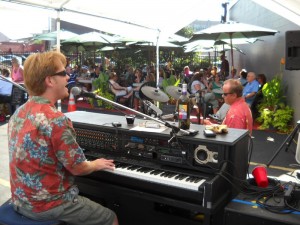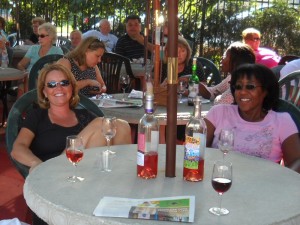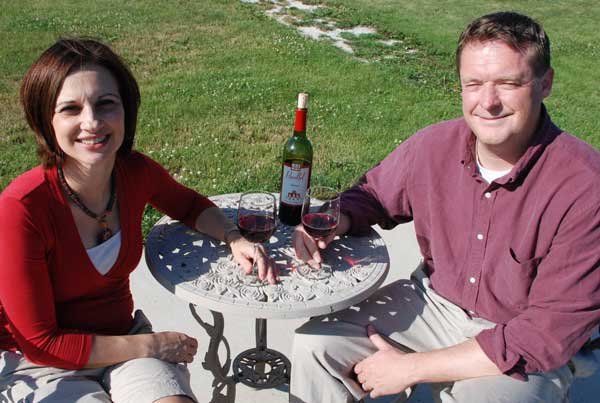Growing with Downtown Indy at Easley Winery
Publisher’s note: This is the second in a three part series on how wineries structure successful events
 Lacking the dramatic backdrop of vineyards, urban wineries, such as family owned Easley Winery in downtown Indianapolis, bring in customers with music, art, festivals and performances, and, of course, with wine.
Lacking the dramatic backdrop of vineyards, urban wineries, such as family owned Easley Winery in downtown Indianapolis, bring in customers with music, art, festivals and performances, and, of course, with wine.
Because urban neighborhoods can change rapidly, successful city wineries must be adept at evolving with their environments. Easley Winery has been in its current location, a former ice cream factory, since 1974. Easley’s marketing director, Meredith Easley, explains that the area around Easley has changed from industrial to residential over the years. Most of this change has occurred in the past 12 years with over 3,200 residential units being built downtown. “We’re happy with the residential growth of downtown Indianapolis,” she said. “The changes have impacted our winery. It’s not better or worse, just different.”
While having more potential customers within walking distance has been a benefit, Easley has had to restructure some of its events in response to businesses that accompany residential growth. For example, Easley Winery has had live music in their garden area (see photos) every Saturday from May through September since 2004 with performances consistently attracting between 50 and 150 people. Until recently, Easley had also been holding concerts on Tuesday nights. However, the Tuesday concerts are now suspended because a new local business began loading trucks on Tuesday nights, making the music difficult to hear. The trucks also use parking spaces that were once available for winery customers. The changing neighborhood also contributed to the elimination of a street festival that Easley organized for eight years, again because of noise and downtown parking restrictions.
Meredith Easley recognizes that change is inevitable for urban wineries. Whereas the customer base was once employees of nearby manufacturing plants, the clientele is now more urban professionals who demand not only quality wine but also an experience to go with it. With her extensive background in events management – she spent seven years with the Indianapolis Parks Department planning concerts and three years with the Indianapolis 500 Festival – Easley is constantly working on new events and promotions. Her favored approach is to partner with event sponsors so that both the sponsor and Winery benefit.
For example, when the Winery decided to open a wine garden, Easley sought partners from a culinary school, two newspapers, and a company that creates outdoor ornamental waterfalls. The culinary school partnered with enough cash to defray half the cost of her musicians for the summer. To publicize the wine garden opening, Easley traded use of the winery for events with local newspapers in return for advertising. The waterfall company designed the winery’s fountain in exchange for promotion at the winery and its events.
‘Every performance date in the garden, we have a script for the musicians to read thanking all partners, plus 5,000 flyers printed with the sponsor’s logo and a large banner hung on our street corner all summer highlighting Groovin’ in the Garden and the sponsors,” Easley said.
 Easely also has long-standing relationships with local media outlets that she describes as “full-fledged media partners.” These media partners don’t pay the winery; instead they agree to provide complete public service coverage of winery events. “For TV sponsors, they conduct a live remote the morning of the event. A print outlet media partner might run a full-page ad. For radio partners, the station would run several 30 second promos and give me the schedule after they run. In short, they treat the event and the winery as if we had paid for the promotions,” she said. ‘Radio, TV and print media openly work with us to promote the winery’s events that are deemed good civic activities.”
Easely also has long-standing relationships with local media outlets that she describes as “full-fledged media partners.” These media partners don’t pay the winery; instead they agree to provide complete public service coverage of winery events. “For TV sponsors, they conduct a live remote the morning of the event. A print outlet media partner might run a full-page ad. For radio partners, the station would run several 30 second promos and give me the schedule after they run. In short, they treat the event and the winery as if we had paid for the promotions,” she said. ‘Radio, TV and print media openly work with us to promote the winery’s events that are deemed good civic activities.”
While events are an important aspect of the 90,000 gallon a year winery’s business, Easley said there are trade offs. Currently, the winery is not open after 6:00 p.m. because Easley family members choose to maintain some balance in their lives. “We could increase our business by being open at night, but then we’d never see our families,” she said.
Easley offers this advice to urban winery owners: “Successful events require making a routine commitment. See what is open on the winery production calendar on a regular basis, because it takes three years of having events to develop a core group of people who always attend. This means checking with winery production and with other scheduled events such as dinners or concert series.”
The interesting history of Easley Winery, whose founders Jack and Joan Easley helped start the modern Indiana wine industry, is described on the Winery’s website at http://www.easleywinery.com/story.html.)
[wp_geo_map]


